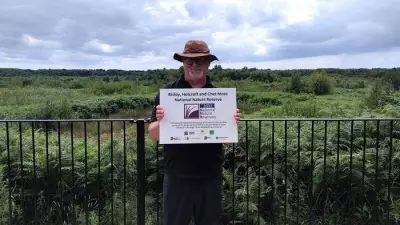
A Bristol chef has revealed how he saves hundreds of pounds on his monthly food shop by foraging wild ingredients from local parks and green spaces.
Lewis Pidoux, 41, estimates he saves approximately £200 each month during spring by supplementing his diet with nettles, wild mushrooms, dandelions and other edible plants he finds growing naturally.
From Childhood Blackberries to Full Meals
The professional chef, who works at Toby Carvery, developed his passion for foraging in his early 20s after childhood memories of collecting blackberries with his father.
"Foraging is seen nowadays as a niche hobby but it's the way our ancestors survived, so I think there's a deep need to do it," Lewis explained. "It's part of us all."
After nearly two decades of foraging experience, wild ingredients now comprise roughly one-fifth of his diet, with creative dishes including nettle pakora, acorn pancakes, and southern fried 'chicken of the woods' mushrooms.
The Financial and Environmental Benefits
During the warmer months, Lewis only purchases meat and root vegetables from shops, getting his fruits and green vegetables entirely from foraging expeditions he undertakes every other day.
His savings decrease to around £100 monthly in winter when foraging opportunities diminish, but he still incorporates foraged ingredients as much as possible.
Lewis has recently reduced his working hours as a chef to focus on expanding his YouTube channel, where he's been educating people about wild foods for six years.
He noticed a significant surge in foraging interest during the pandemic, noting: "People had time off work so they were getting a bit more interested in being outside. I also think there was that slight fear of food scarcity."
Safety First: Essential Foraging Advice
Despite the growing popularity of foraging, Lewis emphasises the importance of proper education and safety precautions.
"Take it slowly," he advises beginners. "Don't try and learn too much at once. It can be dangerous if you're trying to learn too many plants at once."
His essential safety tips include:
- Pick two or three plants initially and learn everything about them
- Avoid the carrot family until experienced due to deadly lookalikes
- Never rely on plant-identification apps, which he's found dangerously misleading
- Only take what you need and always seek landowner permission
Lewis particularly cautions against giant hogweed, which can cause skin damage through mere contact, and recalls how an app once misidentified deadly hemlock water dropwort as wild celery.
Looking ahead, the enthusiastic forager is considering attempting a fully foraged diet for several months, though he acknowledges it would require substantial autumn harvesting to survive winter, much like his ancestors would have done.
"I'm thinking about in the future doing a video on going for several months just eating foraged foods," Lewis stated. "I would like to try that out."





